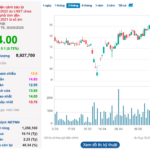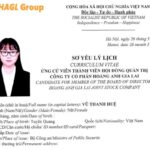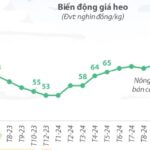Pivoting to a 4-Tree, 1-Animal Model
On June 6th,
Speaking at the event, Mr. Doan Nguyen Duc (known as “Bầu Đức”), Chairman of HAG’s Board of Directors, stated that in the past, whenever
“We have been working hard to reduce our debt and clear accumulated losses for the past nine years, and we are almost there.
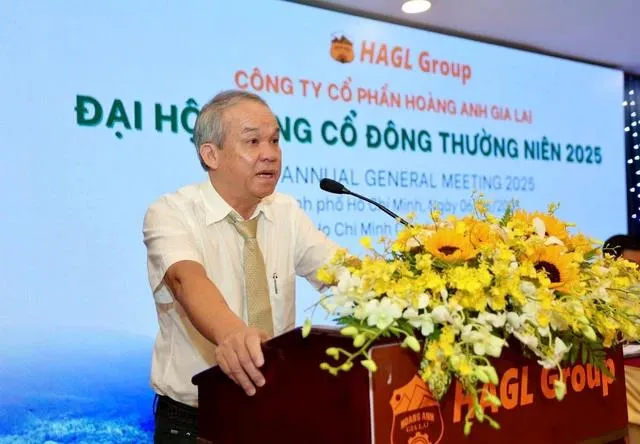
Mr. Doan Nguyen Duc speaking at the 2025 Annual General Meeting.
Addressing a shareholder’s question about why the company didn’t increase its area in 2024 to ensure compatibility and stability between sales software and e-invoices/accounting software, as well as to prevent similar incidents from recurring, and why it didn’t rebuild its pig herd in time, Bầu Đức explained that they had initially planned to expand their banana area but had to reconsider due to financial constraints and difficulties in capital mobilization.
The same issue applied to their pig business. Due to capital constraints, they had to pause for a year, resulting in low pig sales despite favorable market prices.
This year, Bầu Đức announced that they would invest in 2,000 hectares of mulberry, a new crop that the company started experimenting with in 2024. Theoretical and practical indices have been refined, and
“On one hectare of land, mulberry will outperform all other crops we’ve tried. We will plant 2,000 hectares of mulberry this year for sericulture and silk export. We are also investing in 2,000 hectares of Arabica coffee, as its price has reached $9,000 per ton, almost double that of regular coffee. These are our two major programs,” Bầu Đức shared.
As part of their strategy to reach 30,000 hectares by 2030,
“I’m sharing this not to boast. If no shareholder had asked, I wouldn’t have mentioned it. I prefer to act first and speak later. But today, I feel it’s necessary to clarify that
Regarding dividend distribution, Bầu Đức acknowledged the challenges the company has faced since 2016 and requested shareholders’ patience for one more year. Their primary goal over the past eight to nine years has been to minimize debt. Bầu Đức projected that they would aim for a post-tax profit of VND 5,000 billion by 2028.
He also provided an update on their sturgeon project in Laos, where they are currently rearing 700,000 fish as a pilot. The first batch of fish is expected to be sold in September or October, with final conclusions likely by the end of the year.
Currently,
Leaving the Dark Times Behind
On special incentives for key personnel, Bầu Đức acknowledged the extremely challenging period
“I think this way:
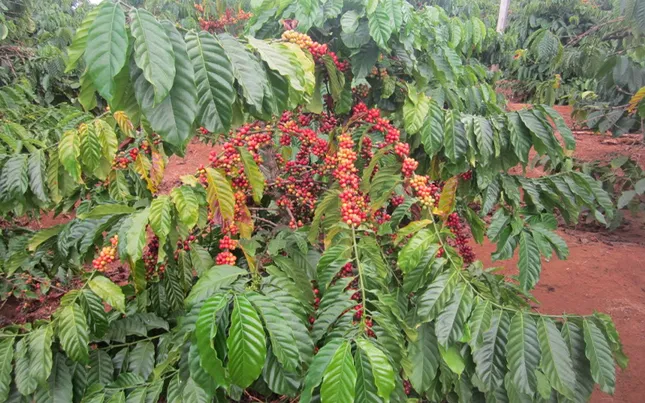
HAG adds mulberry and coffee to create a 4-tree, 1-animal model with five product lines.
Recalling the difficult period in 2016-2017 when the company couldn’t pay salaries for five months, Bầu Đức expressed his gratitude for the staff’s loyalty. He stated that even if shareholders didn’t approve, he would use his own money to compensate the employees. Without these dedicated individuals,
As a result, HAG will issue 12 million ESOP shares to employees who have contributed for at least ten years. The transfer of these shares will be restricted in phases: 10% transferable after three years from the issuance date, an additional 10% after four years, and fully transferable after five years.
Regarding the plan to issue 210 million shares to convert bond debt, Bầu Đức confirmed that HAG would immediately reduce its debt by VND 4,000 billion. He pledged that after the issuance, HAG would not distribute shares to avoid dilution, as was done previously.
This year, HAG aims to achieve revenue of over VND 5,500 billion, a decrease of about 5% from the previous year. The largest contributor is expected to be the fruit segment (bananas and durians) at 76%, followed by the pig business at 19%, with the remaining coming from other goods. The company targets a post-tax profit of over VND 1,100 billion, a 5% increase, and this will be the fourth consecutive year of achieving profits above VND 1,000 billion if successful.
The Maverick Mogul: A Self-Made Billionaire’s Journey
The Thaigroup-affiliated shareholder bloc, holding 11.47% of HAG’s charter capital, has nominated Ms. Vu Thanh Hue for the Board of Management and Mr. Nguyen Tien Hung for the Inspection Board of Hoang Anh Gia Lai Joint Stock Company for the term 2025–2030. Meanwhile, Mr. Duc has nominated himself to retain his position as Chairman of the Board of Management.
“Thaigroup and LPBS Nominate Members for HAGL’s Board of Directors”
The Hoang Anh Gia Lai Joint Stock Company (HOSE: HAG) has unveiled its slate of nominees for the Board of Directors and Supervisory Board for the upcoming term (2025-2030), to be elected at the forthcoming 2025 Annual General Meeting of Shareholders. Notably, alongside current members, the nomination list features several candidates from the large shareholder group holding 121 million HAG shares.


